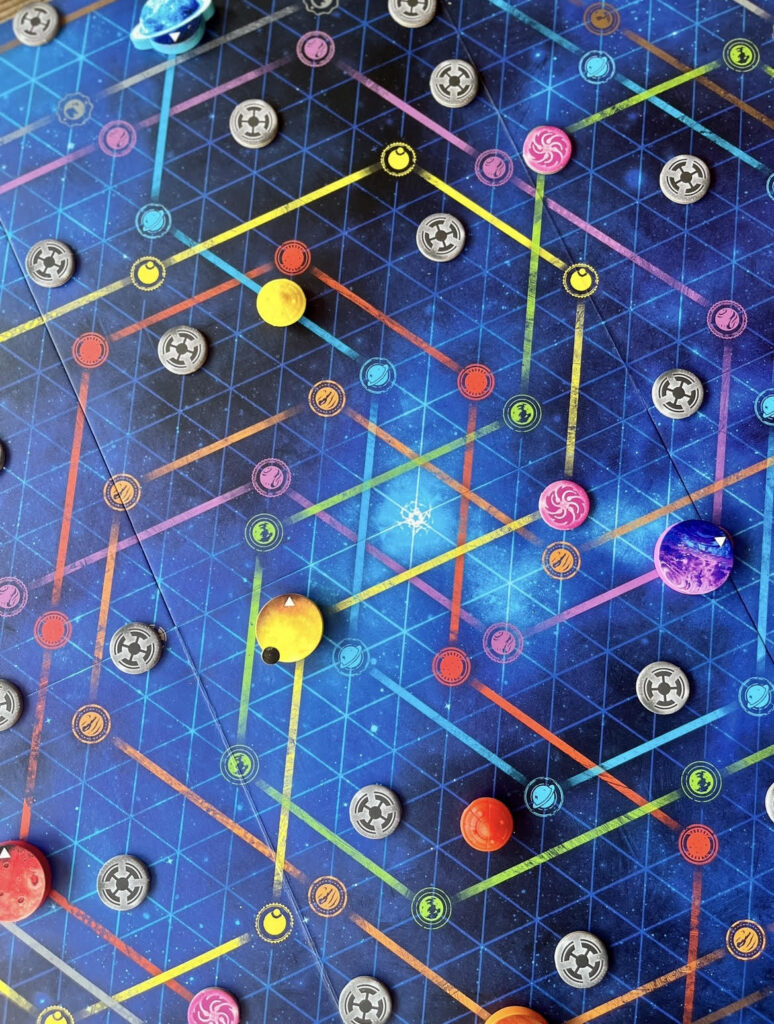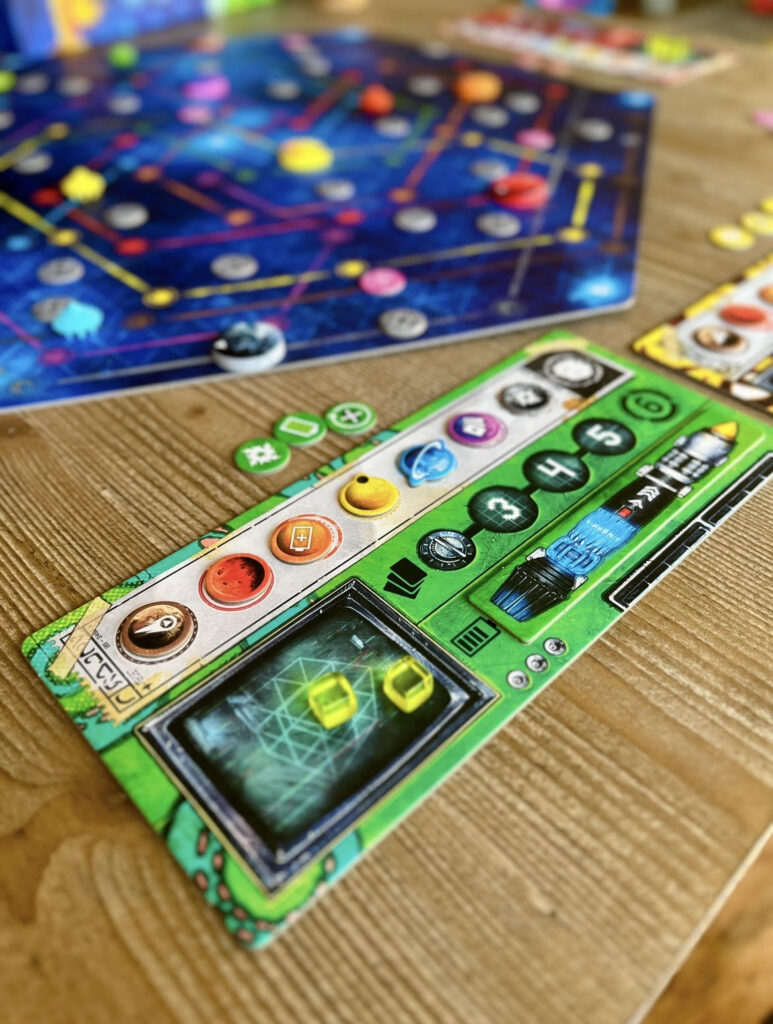Reiner Knizia is a wonderful game designer and an absolute mensch. I adore the man. I fawn over his work to the same degree I did when my daughter did literally anything in the first year of her life. But in the case of Orbit my fawning kind of came with an asterisk.
Orbit is decent. Solid. Fine. I’m not mad at it, but I’m not over the moon either. The base game in particular is almost a little…whispers…boring. Which, for a Knizia fan like me, feels like borderline heresy to admit. But hey, I can be objective. Look, I’m growing.

Of the three games in the trilogy, Orbit feels the least thematic. You’re supposed to be zooming around space, visiting planets in a futuristic tourist race, but honestly, those planets could be anything…fruit stands (it’s Colorado Palisade Peach season so I’m playing this in real life), outlet malls, stops on Route 66. The theme doesn’t do a whole lot of lifting here.
(For the record, ORBIT stands for “Orbital Race Between Interstellar Tourists”.)

Mechanically, the idea is cool: plan your route, hop around the galaxy, visit all the planets on your board, and return home before your opponents do. You’re improving hand size and energy storage along the way to move as efficiently as possible.
On your turn, you play a card and do what it says. You can do the actions in any order, which adds a nice little order-of-operations puzzle to the mix. Each card typically moves at least one planet, lets you scoot your ship, gain energy for extra movement, or change the orbital direction of a planet. You’ll draw back up to your hand limit, and repeat.
The best part is easily the multi-use cards. You’re not locked in to doing everything the card says, but you do have to move the planet shown, which can either help or annoy your opponents. That’s half the fun. Bumping a planet just out of someone’s reach is always a joy (for you).

So you do interact, but in a gentle, maybe slightly passive-aggressive way. I’d say it’s the kind of interaction you chuckle at, not rage-quit over. However, the whole thing has a sort of low-energy hum to it. It’s pleasant, but it doesn’t necessarily call you back.
And that’s where the expansion and variants come in. These are where the game finally wakes up (wakes me up).
There are six modules total, and each one adds some very welcome shakeups. Within the base game itself, there are three variants. For two players, the Prism module adds an extra planet everyone has to visit, which makes the game a little harder. There’s also an advanced two-player mode where each player gets two boards and two ships. This definitely lengthens the game but not quite like we expected, because you upgrade your hand size and energy storage quickly.
There’s a 2v2 team variant too. We didn’t try it, but it’s nice that it exists.
The expansion really opens the game up. If I’m being honest, I wouldn’t recommend playing Orbit without this. I think this is the first time I’ve ever said that about a game I’ve reviewed. I’m almost always in the camp of not getting enough use from expansions, unless I’ve played the game to death. The base game reminds me of Cascardero before you add in its variant. It’s just too stripped down. So if you were fine with base Cascadero, you might feel differently. But if, like me, you wanted more from it, you’ll probably want the expansion.

Here’s a quick peek at the expansion’s modules:
Navigation Tokens: These give you three powerful, one-time abilities and help shorten the game. As with all single use tokens, the key is to use it at the optimum time.
Hyperaccelerator: After you fully upgrade your energy capacity, you unlock a final upgrade that lets you ignore energy cubes and instead fly in a straight line to any reachable intersection.
Artificial Nebula: This one is *chef’s kiss*. You can block intersections on planet orbits with nebula tokens, forcing planets to skip over them every time they pass by. It permanently changes the board and drastically changes the strategic possibilities
I think just throwing all three of these into the game is the way to go. Together, they crank up the player interaction and make the decisions juicier. Without them, the game just doesn’t have enough bite for me.
Orbit has its charms, but it doesn’t quite do it for me without the help of its expansions. With them, you’ve got yourself a fun, strategic little space hop.
Thank you to Bitewing Games for the review copy.
Thanks for the review! I feel like a lot of games are falling into the bucket of “it’s fine” lately. Most games are pretty good, but there’s vanishingly few games published each year that would break into my top 10.
I met up with a friend who stepped away from board games just before the pandemic ask me “What’s been really new in the past 5 years”, and I kinda struggled to answer. Beyond the Sun was the one that I felt was pretty unique
I agree, Beyond the Sun is great and definitely one of the more unique titles! It’s difficult to think outside the box these days when there’s just so many games to contend with. I just realized several of your comments went to spam automatically and I missed them. Fixed now!